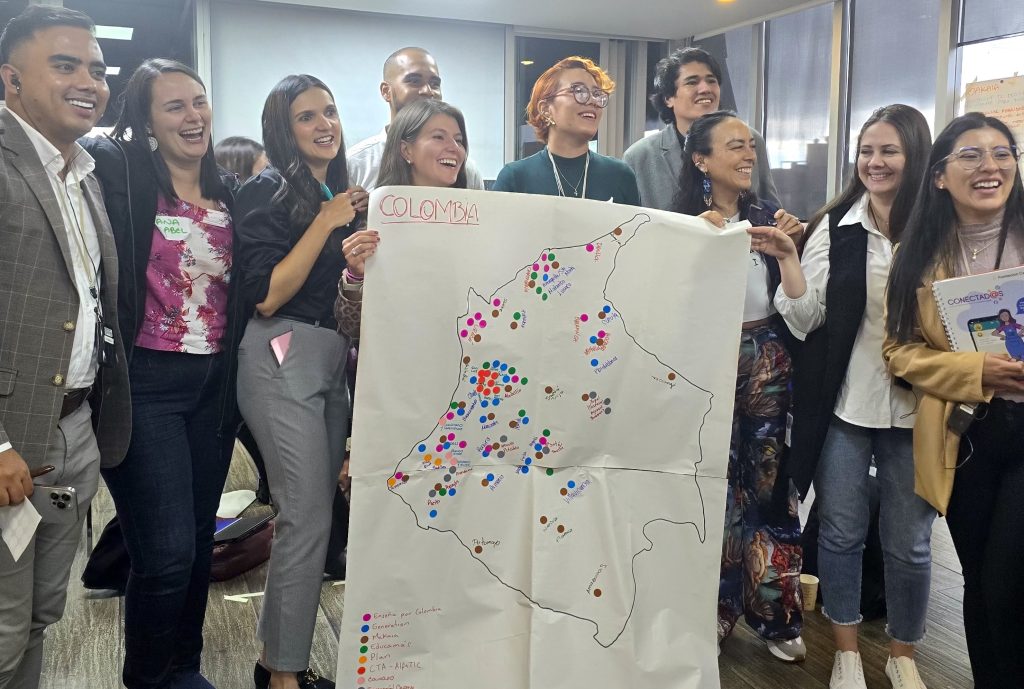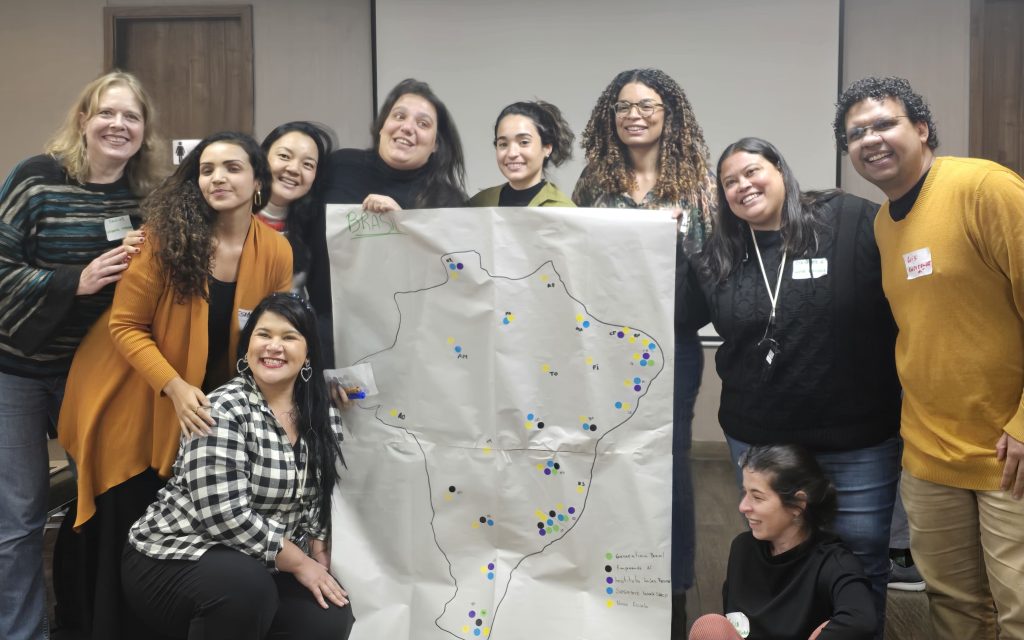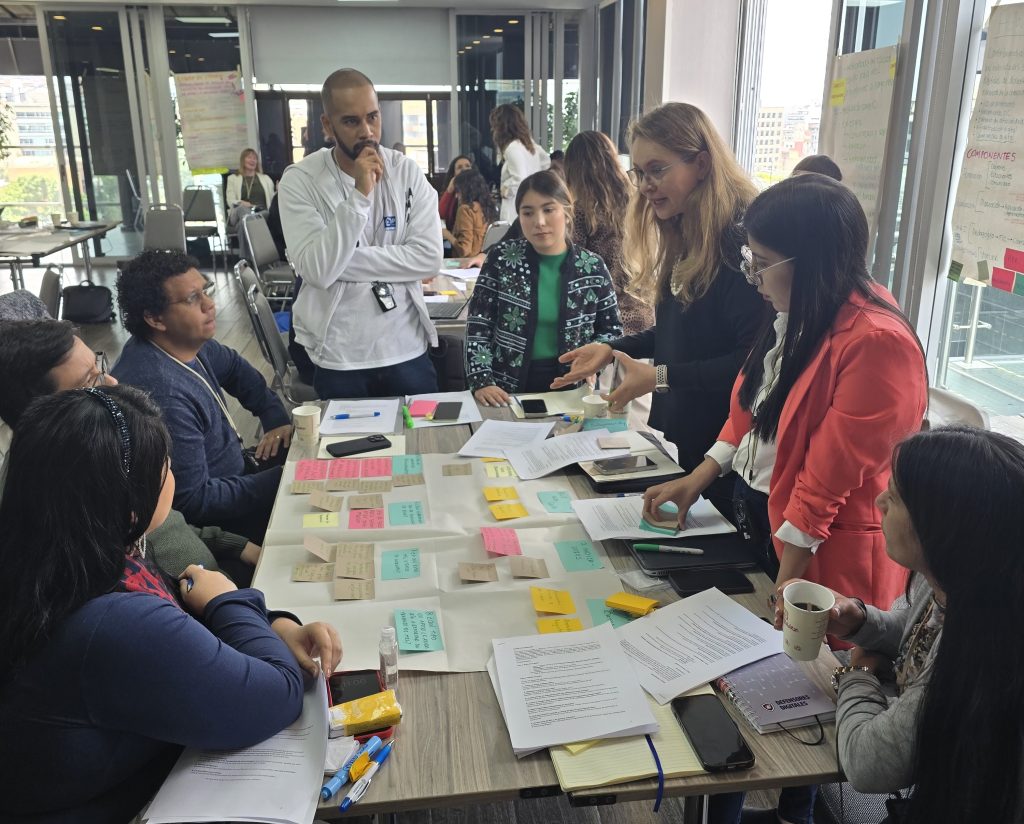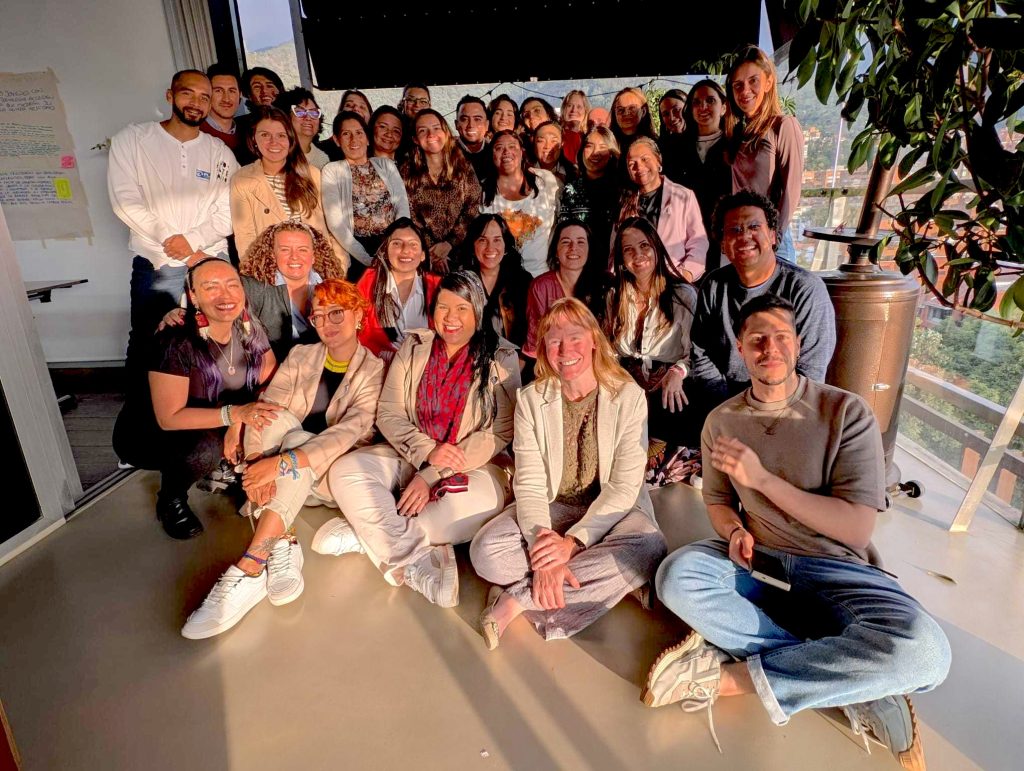More than a Meeting: the SCILLS Gathering as a Milestone for Learning and Growth
By Fatima Zahra Lbouhmadi, Monitoring, Evaluation, and Learning Specialist
In April 2025, the Internet Society Foundation hosted its seventh SCILLS grantee gathering, bringing together 29 people from 14 partner organizations from Brazil and Colombia for three days of connection, reflection, and learning in Bogotá. As always, these gatherings are as meaningful as we hope them to be — spaces where people come together not just to share progress, but to build trust, exchange experiences, and stay grounded in a shared mission: expanding opportunity through the Internet, for all.
This convening — followed by five days of field visits across Colombia — offered the Foundation and the SCILLS team an essential opportunity: to hear directly from the grantees and communities driving digital skills programs on the ground, and to reflect on the real impact of our shared work. It also reflects a core part of our grantmaking approach: creating space for mutual learning, not just reporting. During the convening, the Foundation team also shared updates on strategy and reflections—ensuring the dialogue flowed both ways.
The participating grantees, representing three SCILLS funding cycles (2022–2024, 2023–2025, and 2024–2026), lead projects across a wide range of environments — from remote rural schools to urban entrepreneurship hubs. Their methods differ, but their purpose is shared: expanding digital opportunity and helping communities thrive in an increasingly connected world.
These gatherings are milestones. They give us space to understand what’s working, what needs support, and how we can grow stronger together. And perhaps most importantly, they remind us why we do this work in the first place — by putting faces, voices, and stories to the data and numbers we see in reports.

Where We Work, Why It Matters
The gathering opened with a hands-on mapping exercise. Using two large flipcharts — one for Brazil, the other for Colombia — participants marked where their projects are based and who they serve. What began as a simple visual quickly turned into something more powerful: a shared moment of recognition. Seeing their work represented collectively helped everyone grasp the full geographic scope of the SCILLS community, and sparked conversations about common priorities, overlapping regions, and potential collaboration.
In the afternoon, attention turned to digital safety, which is a priority area of ISOC’s 2030 Strategy. Grantees shared how they’re addressing online risks in their work — especially in communities where access is growing faster than awareness. The session surfaced both challenges and creative strategies, reinforcing the importance of integrating digital security into program design from the very beginning.

Measuring What Matters: A MEL Session Rooted in Learning
The Monitoring, Evaluation, and Learning (MEL) is central to how the Internet Society Foundation understands its impact. For us, MEL isn’t just about tracking results — it’s about learning. It helps us listen more closely, understand what’s working (and what’s not), and adapt as we go. Within SCILLS, we think about impact as the real change that happens when people and communities gain the digital skills they need to grow and participate fully. And learning — at every stage — is what helps make that change meaningful and lasting. On Day 2 of the grantee gathering, MEL took center stage — not as a technical exercise, but as a shared space to reflect on the change we’re all working toward.
The session began by grounding participants in the basics: how we move from activities to outcomes and why mapping this pathway matters. From there, participants reflected on the change they aim to create in their communities, and how they know it’s happening. In an open and collaborative environment, they shared the MEL tools they use in their projects, discussed how they collect data in different settings — from urban centers to remote rural areas — and exchanged strategies for capturing impact in ways that are both meaningful and manageable.
Throughout the day, the SCILLS’s MEL specialist conducted interviews with participants to understand how MEL is being applied on the ground. The insights were rich and thoughtful:
“MEL is part of our DNA. From a student’s first contact with us to five years after graduation, we use it to guide decisions and continuously improve.”
Andrea Matsui, Generation Brasil, Brazil
“Monitoring helps us serve our communities better. It gives us the feedback we need to improve training and open real opportunities.”
Ana Isabel Restrepo Guerra, Makaia Foundation, Colombia
“We often collect more data than we can use. This session helped us think about how to prioritize what matters—and create more space for reflection.”
Julia Tomchinsky, Sesame Workshop, Brazil
These conversations reinforced a core belief of the Foundation: MEL should be a source of clarity and learning, not a burden. The Internet Society Foundation, through its MEL team, is committed to creating flexible, accessible MEL practices that support grantees. The focus is on adaptive learning, practical insights, and safe spaces to explore what’s working — and what’s not.
“MEL is how we stay connected to reality. It helps us listen to our grantees, see patterns across contexts, and improve the way we support positive change. It goes beyond measurement and numbers —it’s about stories of change and making smarter, human decisions.”
Fatima Zahra Lbouhmadi, MEL Specialist, Internet Society Foundation
At its core, MEL at the foundation is not just about accountability. It’s about learning. And it’s in these collective moments — gatherings like this one — where learning truly takes shape, driven by the people closest to the work and real impact.

Listening to the Impact: Voices from the Ground
On the final day of the gathering, the spotlight shifted to the voices of those impacted by SCILLS. In a panel discussion, program beneficiaries — students, entrepreneurs, and educators — shared how gaining digital skills has built their confidence, opened new doors, and transformed their communities.
To deepen this understanding, the Foundation team spent the following week visiting grantee sites across Colombia. In Antioquia, visits to rural schools in Chigorodó, Carepa, and La Cadena offered a close look at how students and educators are using connectivity to enhance learning. In Chaparral, educators and students shared personal testimonies about SCILLS’ impact, while the team also joined a community panel with education authorities and visited the local Digital Access Point under the ALFATIC program. In La Cachuda, Valle del Cauca, women entrepreneurs spoke about how digital tools are helping grow their businesses and strengthen their independence. Finally, in Cali, a community fair hosted by the Plan Foundation showcased the work of women beneficiaries, who presented their products and shared how digital literacy has opened new economic pathways.

Looking Ahead
The Bogotá gathering marked the seventh SCILLS grantee gathering—and certainly not the last. Each one serves as a milestone, offering the SCILLS team a meaningful opportunity to pause, reflect, and learn directly from the people and communities driving change on the ground.
These moments, where grantees, beneficiaries, and the Internet Society Foundation come together, are central to how SCILLS learns, adapts, and grows. As we continue working toward our 2030 roadmap, the SCILLS program remains committed to creating more of these spaces: for learning, for connection, and for shaping the future of digital empowerment — together.

Know more about the partner organizations that participated in the gathering:
Colombia
Asociación Colnodo
Centro Tecnologia Antioquia (CTA)
Change Makers for Kids
Ensena por Colombia
Fundación Capital
Fundación Educamás
Fundación PLAN
Generation You Colombia
Makaia
Brazil
Associação Nova Escola
Empreende Aí
Generation You Brazil
Instituo Lojas Renner
Sesame Workshop Brazil
TechSoup
Learn more about previous SCIILS gatherings:
2023: Five takeaways from the SCILLS in-person grantees kick-off
2024: Women Entrepreneurs Driving Change Across Indonesia
